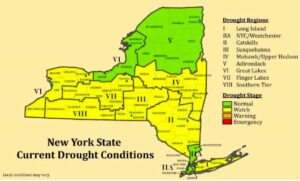Drought Watch New York
August 18, 2022
On August 16th, New York Governor Kathy Hochul directed the New York State Department of Environmental Conservation to expand the state’s drought watch to 49 counties- every county except for those in the Great Lakes, Adirondack and NYC / Westchester regions. This announcement follows the July 29th addition of 21 counties in Western and Central New York to the state’s drought watch. The current drought risk comes from the combination of above average temperatures and low rainfall throughout the state. New York’s “Watch” category is the lowest risk out of the four drought categories of: Watch, Warning, Emergency and Disaster. Under the drought watch no mandatory water use restrictions are in place, but residents are strongly encouraged to reduce their personal water use. Here are some ways that you can cut down on your water consumption:
- Watering Lawns: The most effective way to conserve water with your lawn is to water it less often. Turning off sprinkler systems, and reducing how often you water your lawn will both drastically cut down on your water usage. Some other ways to cut back on water use are watering your lawn early in the morning, which can reduce evaporation, and cutting grass at a higher height, which leads to healthier grass that uses less water. You can also collect rainwater, and use it to water your plants. Finally, consider petitioning your local golf course to upgrade to a more efficient sprinkler system, or cut back on how often they water their greens. A 2015 study found that on average US golf courses use 130,000 gallons of water each day per course, numbers that are unsustainable given the current drought conditions.
- Showers: A great way to cut down on home water usage is to conserve water in the shower. This can include turning off your shower when you shampoo your hair, buying a water conserving shower nozzle, or taking less time in the shower overall.
- Washing Sustainably: Using running water to wash things such as dishes, produce, cars and sidewalks can use a lot more water than is necessary. Instead of keeping water running indefinitely, using a sponge, or letting something soak in a basin is an easy way to reduce water waste. Next time, try washing your fruit in a bowl instead of under the tap, washing a car with a sponge and bucket instead of going to a car wash, or sweeping the sidewalk instead of hosing it off. For appliances like dishwashers and washing machines, make sure you only use them when they are full.
- Pipe Maintenance: If you have any leaky pipes, faucets or hoses, make sure you get them fixed! Even small leaks can add up to waste a lot of water over time, and this is the perfect time to work on them.
- Groundwater Well Regions: The drought watch in New York will most affect the regions that rely heavily on groundwater wells, meaning that New Yorkers in those regions should work especially hard to conserve water. This website has information on the levels of groundwater wells by county, and it can help you find out where your county stands in terms of its groundwater wells.
- Wildfire Prevention: In addition to the drought watch, the majority of New York State is also under high wildfire risk. Drought conditions feed into the wildfire risk, so it is especially important right now to take steps against wildfires. When camping, use existing fire pits, clear fire areas of flammable materials, and do not leave campfires unattended under any circumstances. It is also crucial to drown out fires with water after use, including any embers that may be covered.

Related Articles
THANK YOU TO OUR PLATINUM CORPORATE PARTNERS
Website by Trillion.
© 2017 New York League of Conservation Voters Education Fund. All rights reserved.









